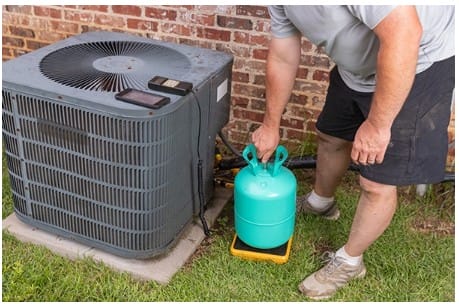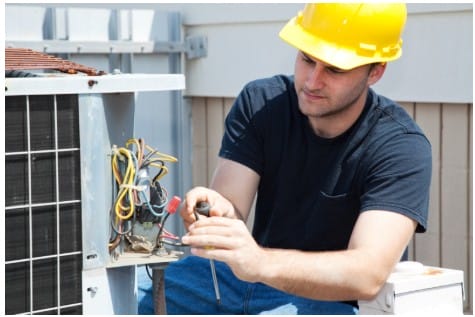
A familiar question when dealing with a variety of important expensive possessions, such as your car, your phone, or other facets of your home such as insulation is, when you’re not happy with your air conditioning and heating, do you repair it or do you just replace it?
Naturally, if you get a brand new system, it’s going to be operating full throttle and will probably be quite fancier, rather than the uneven temperatures, high energy bills, the odd noises, the pollen, and whatever odd undesirable phenomena you may be experiencing. On the other hand, that’s a significant investment, which you could mostly avoid by just spending on a repair instead.
The answer to this isn’t all that straightforward. We are going to look at a bunch of different factors in this piece. You may indeed find out that repairing your system could be costing you even more than ordering a new one. Let’s tackle the main considerations.
Age of the System
HVAC systems are created with a certain service life. Sooner or later they’re going to go bad. If it’s having a lot of problems and is already supposed to be at this age, it may be unwise to splurge on something that isn’t going to be operating for much longer anyway. Granted that maintaining it well will allow it to serve you longer, air conditioners generally last about 10 to 15 years. For furnaces and boilers, it’s 15-20 usually.
Also keep in mind that if you do decide to repair an old system, such systems tend to require repairs a lot more often. Its technology may be outdated and require an expensive refrigerant and it’s likely not very powerful anymore and is thus costing you more on your utility bills. On top of that, a new system will probably run quieter and can even be integrated with your smart home system if you have one.

Warranty
Most new HVAC Manhattan systems come with a manufacturer’s warranty that typically lasts between 5 and 10 years, depending on the brand and the model. Some warranties even offer extended coverage if the unit is registered shortly after installation. Labor charges still incur additional fees unless you purchased a labor warranty or service contract. On the other hand, if your warranty has expired, any repair costs will come entirely out of your pocket. A new HVAC system will come with a fresh warranty,
Efficiency
Even if your unit is technically still working, it may be operating far below modern efficiency standards-costing you more in monthly energy bills and delivering less comfort in return. However, often it only takes a furnace repair service to get your system working correctly again. If it hasn’t been serviced lately, it may be cheaper to get it repaired and bring its efficiency levels back up.
Older HVAC systems tend to have lower SEER (Seasonal Energy Efficiency Ratio) ratings for cooling or lower AFUE (Annual Fuel Utilization Efficiency) ratings for heating. For example, an air conditioner from 15 years ago may have a SEER rating of 10 or less, whereas modern systems are required to have a SEER rating of at least 14-and many high-efficiency units rate at 18 or higher. That difference translates directly into how much electricity your system uses to cool your home.
Financial Incentives
Many utility companies, state programs, and even federal initiatives offer rebates, tax credits, or other incentives for upgrading to energy-efficient HVAC systems. These programs are designed to encourage homeowners to reduce energy consumption and environmental impact. For example, replacing your old system with one that meets Energy Star standards could qualify you for hundreds—or even thousands—of dollars in rebates, depending on your location and the specific equipment you choose.
Federal tax credits since the Green New Deal are also available for qualifying HVAC upgrades, especially those involving heat pumps, high-efficiency furnaces, or advanced central air systems. Then there are financing options, as many HVAC manufacturers and installation companies offer flexible payment plans, low-interest financing, or deferred payments to make system replacement more accessible. Your energy savings each month could actually offset much or all of your monthly payment for the new system.
Cut-Off Line for a Repair vs a Replacement
When you’re having a hard decision on which route to take, the $5,000 rule is a good threshold to operate on. It’s not a hard-fast rule that applies in all cases, but it’s a good general threshold line. Multiply the age of your HVAC system by the estimated cost of the repair, and then see the overall value.
- If it ends up as less than $5,000, a repair is probably the way to go
- If it’s more than $5,000, replacement is likely the smarter long-term investment.
Suppose a coil repair estimate is $400 and the part is 6 years old. Multiply $400 x 6 = $2,400. In this case, the smarter move would probably be to just replace it. However, if the cost of repairing a 15-year-old furnace is $350, multiply that by 15 and you get $5,250. In that case, the slight better move is to just buy a new one.
Frequency of Repairs

It’s a totally different story if we’re talking about not one single repair that’s going to hold up for a good while but instead you’re having to repair it time and time again. While the occasional repair is normal for any mechanical system, frequent service calls in a short span of time often point to a larger issue: your system is wearing out.
Small repairs like replacing a capacitor or a thermostat might not be too expensive on their own, but when those fixes start piling up—especially with older systems—they can quietly add up to the cost of a new, more efficient unit.
It’s not just about money either. Regular breakdowns mean increased stress, discomfort, and potentially even lost work time as you wait for a technician to arrive. In peak seasons, when HVAC companies are busiest, that could mean going days without cooling in summer or heat in winter—something you don’t want to risk more than once.
Home Comfort
Comfort should never be overlooked. After all, the main purpose of your HVAC system is to keep your home comfortable year-round. If you’re constantly adjusting the thermostat, dealing with hot or cold spots, or feeling like the air in your home is stuffy or too humid, your system may no longer be doing its job.
As HVAC systems age, they can lose their ability to regulate temperature evenly. You might find that one room is freezing while another stays warm, or that your system struggles to keep up during extremely hot or cold days. These are common signs that your unit is no longer sized correctly for your home’s needs—or that it’s simply wearing out.
On a more alarming note, filters may not trap dust, pollen, and other allergens as effectively. Older ductwork can accumulate mold, bacteria, or debris. And if your system doesn’t manage humidity well, you might notice a clammy feeling in the summer or dry, scratchy air in the winter. You could be making yourself sick.






Comments